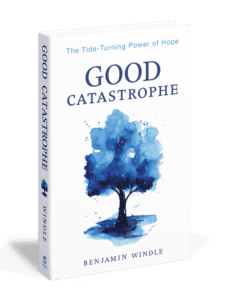- Home
- Spiritual Life
- J.R.R. Tolkien and the Good Catastrophe

J.R.R. Tolkien and the Good Catastrophe
How J.R.R. Tolkien’s Hidden Word Can Help Our Modern Lives
He smoked a pipe, preferred to ride his bicycle instead of driving a car, and once came to a party dressed in a polar bear costume. When dating his future wife, he would sit on the balcony of a café and drop lumps of sugar into the hats of unsuspecting passersby.
J. R. R. Tolkien was an enthralling person.
Although Tolkien was a literary giant of the twentieth century, writing books was really more of a side hobby for him (as was inventing his own languages). His day job was as a professor at the University of Oxford. In addition to the numerous languages he invented from scratch, Tolkien was fluent in Latin, French, German, Finnish, Greek and Italian! Even today, his signature works, such as The Lord of the Rings and The Hobbit, are loved around the world.
Tolkien, however, was no stranger to pain. His father died of rheumatic fever when he was three years old. Later in life, when grieving the death of his closest friend, C. S. Lewis, Tolkien wrote in a letter to his daughter, “So far I have felt . . . like an old tree that is losing all its leaves one by one: this feels like an axe-blow near the roots.”

In his early twenties, Tolkien enlisted to serve in World War I. In the Battle of the Somme, he experienced some of the most brutal and bloody trench fighting of the war. His fellow soldiers were gunned down at an alarming rate, and the likelihood of survival was slim.
But one small detail during the experience changed not only the course of Tolkien’s life but also the course of twentieth-century literature: Tolkien contracted a debilitating fever. On November 8, 1916, he was sent back to England. Tolkien later said that all but one of his dearest friends from school were killed in the war. Tolkien, however, was saved.
I wonder if Tolkien was conscious of this small but significant turn in his story when he coined the term eucatastrophe. It was, after all, not a promotion, an inheritance, or a victory that spared his life. It was a serious sickness. If it were not for this affliction, we would, in all likelihood, never have been graced by some of the most beloved literary works of the twentieth century.
I spent many months searching for a word that shows how good can come from pain. When I couldn’t find an English word, I turned to Spanish, Greek, Latin … and no matter how many dictionaries I combed through, I couldn’t quite find a word with the sense of tension I was looking for. I decided to look back in time, and it was there, in the writings of Tolkien, that I came across a word that to me is extremely special. It’s unique because Tolkien had to create the word to describe what he saw as central to the story of life.
Why is it so hard to find an English word that shows how good can come from our pain? Does it surprise you that I had to reach back into the twentieth century to find a word that comes from a generation that knew immense adversity in order to help us develop a modern vocabulary for hope? It furthers the point that in our world today, we fundamentally see adversity as the enemy to our happiness — and it’s this notion that needs correcting.
Eucatastrophe is a compounding of the word catastrophe with the Greek prefix eu, meaning good. A good catastrophe? I’m drawn to the abruptness of this word. It’s confrontational. After all, the words good and catastrophe are seldom put together, being on opposing ends of the human experience. It’s like two archnemeses joining forces — there’s a tension.
It was in his essay “On Fairy-Stories” that Tolkien first used the term, and in 1944 he wrote to his son, “I coined the word ‘eucatastrophe’: the sudden happy turn in a story which pierces you with a joy that brings tears.” Tolkien had indeed captured a great degree of thought and meaning in that one word.
Think about it — a fever (something bad) preserved Tolkien’s life (something good). The debilitating fever had him removed from the battlefield, where the lives of many of his comrades ended. So, through the rearview mirror of history, we can now say that this sickness provided a turn toward a greater future and a broader good. It is plausible that the fever was the mechanism that saved Tolkien’s life and allowed his gift of writing to be unleashed on generations to come. This reminds me of Steve Jobs (the founder of Apple), who said this in a commencement speech at Stanford University: “You can’t connect the dots looking forward; you can only connect them looking backward. So you have to trust that the dots will somehow connect in your future.”
I’m certainly not for one moment suggesting that every tragedy, loss, failure, hurt or pain is good in and of itself. But is it possible that, in the darkest moments of life, the green sprouts of new life and growth can develop? Isn’t that the whole idea of hope? That when life hits its lowest point, this special gift of hope emerges in its most potent form, enabling us to lift our eyes once more to the horizon?
Tolkien was describing the version of hope I am talking about — at the point of deepest pain is the start of the greatest good.
People have long foraged for words that capture the idea that hope and adversity are not only connected but intrinsically reliant on each other. Beauty from ashes, light at the end of the tunnel, the sun after a storm. The awareness of a hidden link between our difficulties in life and our destiny is not new. Perhaps we don’t realize the strength of this union. Perhaps understanding the marriage between life’s challenges and our potential is one of the great keys to human growth and achievement.
The idea of hope looks nice on Hallmark cards and inspiring quotes on social media, but when we experience hardship in our lives, we need more than slogans and platitudes.
In contemporary thought, the idea of hope is often diluted by the false promise that we can live a trouble-free life, exempt from hardship and crises. Yet, generations before us would attest that it was these very trials and challenges that forged greatness in them. It is this same virtue that is found in the stories of the most innovative companies, celebrated athletes, and high achievers throughout history. Hardship and hope together can do something for us that a problem-free life never could.
Adversity is the ecosystem for new growth and purpose. Stand-up comedian Jerry Seinfeld spoke about his own life journey: “If I had to trade in the experiences I’ve had in my life, the last ones I’d trade in would be the really bad ones. Those are the things I’d hold on to until the end, because those are the ones that harden your resolve.”
We need to reframe how we view our troubles.
Some of your greatest good will come because of pain, setbacks and disappointments — not in spite of them. How many of our opportunities are like Tolkien’s fever in World War I? We need to reframe how we view our troubles.
Tolkien said that good and pain can live together in the same word, and joy and tears can occur at the same point in a story. In the Bible, James says that we can harness troubles as opportunities for growth and learn to celebrate them. Our problems today may look like a dead stump, but it’s from this very state that the new version of ourselves will emerge.
Pain is the antagonist in the script of our life. It provokes an accelerated growth response in our lives like nothing else can. Some of the greatest challenges we experience in life will also turn out to be the best sources of opportunity, renewal, and creativity. Our greatest challenges in life are linked to our greatest growth.
…
From Good Catastrophe by Benjamin Windle, provided by Bethany House, a division of Baker Publishing Group. Copyright 2023. Used by permission.
Order your copy of Good Catastrophe: The Tide-turning Power of Hope by Benjamin Windle.
Trending Now
Sign up today for your Inspiration Today Daily Newsletter
Supercharge your faith and ignite your spirit. Find hope in God’s word. Receive your Inspiration Today newsletter now!
Benjamin Windle
Benjamin Windle is an Author, Pastor, and Millennial/Gen Z Specialist. He has been a local church Pastor for over 20 years, including as a Founding and Senior Pastor. Learn more at benjaminwindle.com
Related Articles
February 23, 2026
The Joy of Being His Workmanship
When life urges us to strive harder and do more, Scripture invites us to rest in a freeing truth:…
February 20, 2026
Stepping Out in Faith When God Calls You to the Impossible
Stepping out in faith often feels uncomfortable—especially when God calls you toward something that…
February 20, 2026
Finding Joy Is a Choice—Even When Life Is Hard
Sorrow doesn’t pause life—and neither does joy. If you’ve ever wondered how to find joy in…
February 19, 2026
The Secret to Supernatural Joy in Your Life
What if joy wasn’t tied to circumstances at all? Supernatural joy—the kind Jesus promised—can…
Next Steps To Strengthen Your Walk
Inspiration Today Newsletter
Supercharge your faith and ignite your spirit. Find hope in God’s word. Receive your Inspiration Today newsletter now!
Christian Articles
Find articles to strengthen your walk and grow your faith. We have a wide range of topics and authors for you.
Submit A Prayer Request
We are here for you. Simply click on the button below to reach us by form, email or phone. Together we will lift our hearts and voices with you in prayer.





